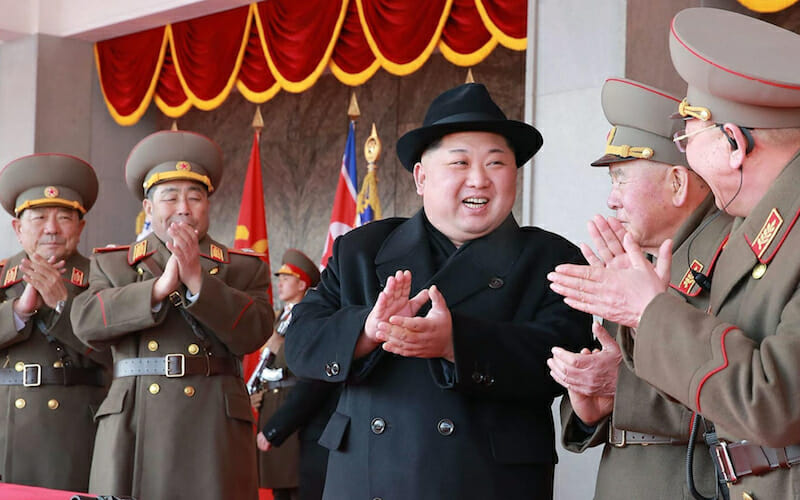
U.S.-North Korea Optimists Should Be Prepared for a Rude Awakening
There’s a burgeoning myth on the political Right in America that Donald Trump might achieve in North Korea what Reagan achieved in East Germany. Let’s put aside the fact that Reagan demanding “tear down this wall” was not the reason the Soviet influence sphere collapsed (I say this not as a reflexive critic of Reagan, but as someone with a degree in Russian History). What these optimists need to realize is that whatever “upside” exists for Trump at the coming summit with the North, Kim Jong-un has North Korea’s coup de grâce on his side of the table: nuclear policy decoupling.
For some of those who believe that “peace in our time” with North Korea is a foregone conclusion, this will be hard to accept. I’ve seen articles such as “Kim Jong Un is either already dead/captured or under some form of mind control” by Ross Daniels. If you already believed our diplomatic counter-party is dead, I can see how it would be hard to believe he has much of a chance of achieving one of his marquee policy goals. Or, if you’re posting/reading things like this top-ranking headline on Reddit’s The Donald community: “Kim Jong Un wants PEACE TREATY, U.S. Embassy in Pyongyang?!! MAGA!!!”
I’ve even seen the Trump/Reagan-in-Berlin comparison at the National Review. To be fair, there’s more antagonism toward Trump’s Korea summit at the National Review than there is dovishness, and I respect them for being willing to publish contradictory points of view in our highly factionalized America of 2018. Nonetheless, Conrad Black had this surprising statement on a Trump/Kim meeting: “The only reason that these talks will take place is that President Trump’s forceful diplomacy has convinced China, which has convinced North Korea, that if its attempt to become a nuclear power does not stop, the United States will prevent it militarily.”
In reality, Kim Jong-un has not likely been cowed by Trump’s supposedly muscular military stances. Kim is coming to the table with his own agenda, and people who don’t understand that agenda are setting themselves up for a severe disappointment and shock should he ever achieve that agenda. The North’s military agenda has not involved a vision of fighting America on Korean soil for a very long time. The beach-head for North Korea’s road to strategic victory on the Korean peninsula has long been nuclear policy decoupling. Trump is the most likely president in our era to put America on the path of decoupling with our allies, and Kim knows this.
This past week, Duyeon Kim from the Korean Peninsula Future Forum wrote an excellent summary of North Korea’s agenda for the Bulletin of the Atomic Scientists. She puts it succinctly: “(Kim Jong-un’s) efforts this week are consistent with past attempts by North Korea to draw Seoul farther away from Washington, weaken the sanctions regime, and ensure its own survival.”
The importance of “drawing Seoul away from Washington” cannot be overstated as a strategic goal for Pyongyang. In Mutually Assured Destruction theory, when one draws an assured partner away from a nuclear assurer state, the first stage of decoupling has begun. Nuclear decoupling is achieved when a state that has granted assurances to an ally that the nuclear force of the assurer (here, the United States) no longer has the political will to deter the nuclear force of that ally’s adversary (in this instance, North Korea).
I’ve written about this at length before, but to recapitulate the key points I’ve made in the past in the context of the coming summit with North Korea, the North’s strategic road to victory does not start by obliterating American cities with ICBM’s and shelling Seoul. That’s actually Pyongyang’s worst-case scenario, when they’ve been invaded by the United States/Japan/South Korea. It actually begins with destabilizing what’s known as “Kelly’s Equilibrium” in MAD theory. Whatever the North can do to attenuate our nuclear assurance to the South opens that road to strategic victory.
Now, if you’re in the tank for Trump, it might be hard to imagine a single scenario where our assurances could be weakened. All the North has to do is convince Trump that the following is at all reasonable: North Korea says it is willing to denuclearize and has no reason to possess nuclear weapons if the military threat against it is removed and the regime’s security guaranteed. This is one of the six points that South Korea claims is on the agenda.
Coming back to Duyeon Kim’s analysis, she puts this agenda point in historical context: Past North Korean leaders Kim Il-sung and Kim Jong-il declared the same heavily conditional position. It is noteworthy that Kim Jong-un has done so too, but should still raise serious doubts.
The one thing I’d like to add to this is that the entire premise of Mutually Assured Destruction theory of deterrence (which is all we have left now that North Korea has ICBM’s) presumes a constant military threat. We have a constant implicit military threat against every nuclear state that is not our ally. That’s how MAD works. If Trump becomes convinced that any form of demilitarizing the continent is reasonable, the North will have achieved one of the great diplomatic coups of our time.
What I’m not saying here is that Trump will create a diplomatic disaster and we cannot let the myth of Reagan’s showdown in Berlin cloud our view of North Korea’s strategic positioning. Pyongyang and Seoul of 2018 are not Berlin and Bonn of the 1980’s, and Beijing is not the Moscow of the Soviet Union. America has to understand what we have to lose before we enter these talks because, unlike the crumbling Warsaw pact of the Reagan era, Pyongyang has a clear notion of its own strategic goals.
